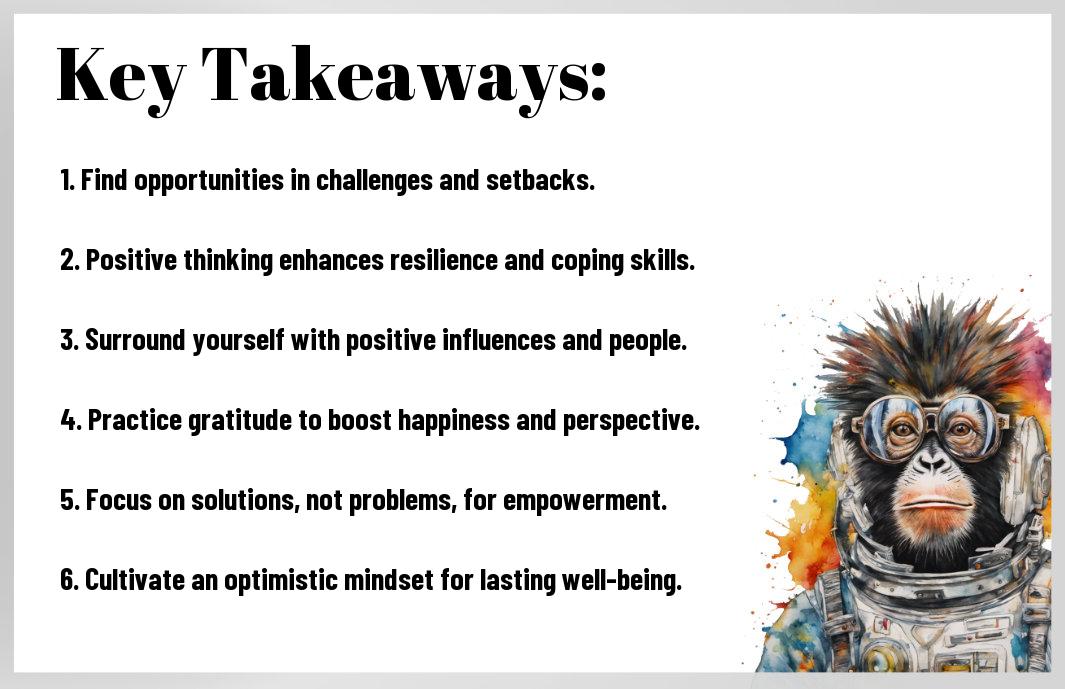
Newsletter Subscribe
Enter your email address below and subscribe to our newsletter

Enter your email address below and subscribe to our newsletter

Many people underestimate the power of optimism, believing it to be mere wishful thinking. However, I’ve found that maintaining a positive outlook can significantly impact your mental health and overall well-being. By choosing to look for the bright side in every situation, you can foster resilience, enhance your relationships, and navigate life’s challenges with greater ease. In this post, I will explore practical strategies to cultivate optimism in your life, providing you with the tools to shift your perspective and embrace a more hopeful mindset.

Before delving into the fascinating world of optimism, it’s crucial to understand its definition and implications. I often find myself reflecting on how optimism shapes our mental framework. According to Optimism – Definition, Meaning & Synonyms, it embodies a hopeful outlook toward the future that can influence your well-being profoundly.
For me, embracing positive thinking has transformed my approach to challenges. This mindset not only supports better mental health but also fosters resilience. Studies suggest that optimistic individuals experience lower levels of stress, improved overall health, and greater satisfaction in their relationships, making it a valuable perspective to cultivate in our daily lives.
Bias towards negativity can cloud our judgment and diminish our ability to see the positive aspects of situations.
Considering the influence of negativity bias in our minds, it’s vital to actively challenge this inclination. When I acknowledge that negative experiences often have a stronger impact than positive ones, I consciously work to seek out the silver linings in every situation. By doing so, I strengthen my resilience and foster a more balanced perspective, enabling me to appreciate the optimistic outcomes that often arise amidst challenges.

Assuming that optimism is a skill, I believe it can be cultivated through conscious practice and intention. By adopting positive perspectives, challenging negative thoughts, and recognizing the silver linings in our experiences, you can create a resilient mindset. With consistent effort and openness, your outlook can shift from pessimism to optimism, transforming both your internal dialogue and external interactions.
For those looking to enhance positivity in their lives, I recommend incorporating simple yet effective practices such as daily affirmations, mindfulness meditation, and engaging in activities that spark joy. Surrounding yourself with uplifting influences, whether through people or content, can also provide the support needed to maintain a positive outlook. Making a conscious effort to focus on the good, rather than dwelling on challenges, will gradually shift your perspective.
Among the many aspects of fostering an optimistic mindset, the practice of gratitude stands out as particularly powerful. By intentionally acknowledging and appreciating the good things in life, no matter how small, I have found that my perspective shifts tremendously. Gratitude helps to counterbalance negativity and can serve as a reminder of the abundance present in my life.
Cultivating a regular gratitude practice allows you to focus on the positives, even during tough times. By maintaining a gratitude journal or simply taking a moment each day to reflect on what you are thankful for, you can reinforce a positive mindset. This act can drastically improve your overall well-being, as it encourages you to notice the bright spots in your life. Studies have shown that those who practice gratitude often report higher levels of happiness and life satisfaction. Embracing gratitude not only shifts your focus but also creates a sustainable positive outlook that enriches your daily experiences.
To cultivate optimism in daily life, I find it crucial to seek out the silver linings in various situations. This practice not only fosters a positive mindset but also promotes resilience during challenging times. Engaging with resources like Optimism (for Teens) | Nemours KidsHealth can provide valuable insights into maintaining a hopeful perspective. By incorporating simple strategies such as gratitude journaling and reframing negative thoughts, I can shift my focus to the brighter side of life and inspire those around me.
To enhance productivity and workplace morale, I apply optimism by fostering a supportive environment. Encouraging open communication and celebrating small wins can motivate both myself and my colleagues, transforming challenges into opportunities for growth.
Relationships thrive when I embrace a positive outlook. A strong, optimistic perspective can strengthen connections, promoting empathy and understanding. By actively listening and celebrating each other’s successes, I build a supportive network where trust and happiness flourish. Moreover, when I approach conflicts with a solution-oriented mindset, I can transform potential issues into opportunities for deeper bonds. Positivity acts as a catalyst for enhancing our shared experiences, making interactions more fulfilling and meaningful.
For many, optimism serves as a guiding light through life’s challenges. Research shows that maintaining a positive outlook can lead to remarkable health benefits, influencing both mental and physical well-being. A glass-half-full perspective not only enhances resilience during tough times but can also affect how you respond to stress, showcasing the profound connection between your mindset and overall health.
Benefits of optimism can significantly enhance mental health by reducing symptoms of depression and anxiety. By focusing on positive outcomes and solutions, you can foster a sense of hope and purpose. This outlook not only boosts your emotional resilience but can also improve your relationships, as positivity often inspires those around you. Therefore, cultivating an optimistic mindset can create a ripple effect, enhancing your social support systems.
For individuals who adopt an optimistic worldview, there’s a notable correlation with improved physical health outcomes. Studies suggest that optimism can lead to lower rates of heart disease and better immune function, as positive thinkers tend to engage in healthier lifestyles. Optimistic individuals are more likely to exercise regularly, eat a balanced diet, and adhere to medical advice, all of which contribute to enhanced vitality.
To truly grasp the significance of optimism on your physical health, consider that an optimistic mindset may also lead to lower stress levels. When you view challenges as opportunities rather than threats, your body’s response is less likely to trigger harmful stress reactions. This can help maintain a healthy blood pressure and heart rate, which are indicative of your overall physical state. Furthermore, an optimistic perspective encourages you to take proactive steps towards preventative care—a proactive approach that often leads to a longer and healthier life.
After experiencing life’s inevitable challenges, it can become increasingly difficult to maintain a positive outlook. Factors such as personal loss, financial strain, or health issues often test our resilience. I have found that these circumstances can create a cloud of negativity that seems overwhelming. It is during these times that we must actively cultivate our optimism, despite external pressures and the weight of our struggles.
At times, setbacks can feel like a punch to the gut. I know all too well how they can derail my plans and leave me feeling defeated. However, I’ve learned that approaching these moments with a positive mindset allows me to reassess my goals and find alternative paths forward. By reframing setbacks as opportunities for growth, I can rediscover motivation and maintain a sense of hope for the future.
By developing effective coping strategies, I can navigate the toughest times with resilience. I often turn to practices such as mindfulness, journaling, and connection with supportive friends. These actions not only help alleviate immediate stress but also enable me to retain perspective on my circumstances.
Further, implementing self-care routines is necessary for maintaining my mental well-being during tough times. I prioritize activities like exercise, meditation, and engaging hobbies that uplift my spirit. Additionally, I find it helpful to surround myself with positive influences, whether it’s friends who encourage me or inspirational content. Like any other skill, cultivating a lasting sense of optimism takes practice. As I navigate through challenges, these strategies remind me that even in the darkest moments, light can still shine through.

Keep in mind that teaching others to be optimistic requires patience and practice. It starts with modeling positivity in everyday situations and offering guidance on how to reframe negative thoughts. I often encourage those around me to focus on solutions rather than problems, fostering a mindset that thrives on possibilities and hope.
Any environment can be transformed by cultivating positivity. I find that when I surround myself with optimistic individuals and engage in uplifting conversations, it creates a ripple effect. By celebrating small achievements and maintaining an open dialogue about challenges, you can significantly influence the atmosphere, allowing positivity to flourish.
Against the backdrop of a world filled with uncertainty, instilling optimism in children is crucial for their emotional well-being. By promoting a mindset that embraces challenges and views failures as opportunities for growth, I empower young minds to approach life with resilience. Fostering an environment filled with encouragement, love, and understanding helps children learn to see the silver linings, which shapes their perspectives as they grow. Incorporating storytelling, positive reinforcement, and actively discussing their feelings enables them to build a toolbox of skills that they can use throughout their lives to handle adversity with hope.
Following this perspective, I find that cultivating optimism by seeking the bright side in every situation can transform our experiences. When you focus on the positive aspects, even in challenging times, you can enhance your resilience and improve your overall well-being. By training your mind to look for opportunities in setbacks, you become more adaptable and open to growth. This shift not only impacts your mood but also influences those around you, creating a more positive environment. Thus, embracing optimism is an empowering choice that enriches both your life and the lives of others.
A: Looking for the bright side means trying to find the positives or silver linings, even in challenging circumstances. It encourages a mindset that focuses on opportunities for growth and learning, rather than just on obstacles or difficulties.
A: Practicing optimism can be as simple as starting each day with positive affirmations, reflecting on things you are grateful for, or re-framing negative thoughts into more constructive ones. Setting aside time each day to focus on the positives can help train your mind to adopt a more optimistic perspective.
A: An optimistic outlook can lead to improved mental health, greater resilience during tough times, better relationships, and even physical health benefits. Optimism often fosters a sense of hope and motivation, making individuals more likely to pursue goals and overcome challenges.
A: Yes, excessive optimism can sometimes lead to overlooking potential risks or dangers. It’s important to balance optimism with a realistic understanding of situations, which enables better decision-making without becoming overly pessimistic or naïve.
A: When encountering failure, try to view it as a learning opportunity. Analyze what went wrong and focus on what you can do differently next time. Cultivating self-compassion and reminding yourself of past successes can also help maintain an optimistic outlook despite setbacks.
A: Yes! Techniques include practicing gratitude, engaging in positive self-talk, surrounding yourself with positive influences, and visualizing success. Journaling about positive experiences and your achievements can also strengthen an optimistic mindset over time.
A: Optimism can enhance relationships by promoting more positive interactions and creating a supportive atmosphere. Optimistic individuals tend to communicate better, have greater empathy, and are more likely to attract others who share similar positive attitudes, fostering stronger connections.